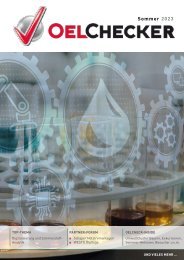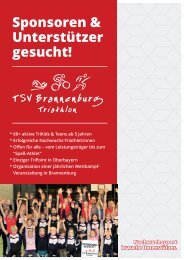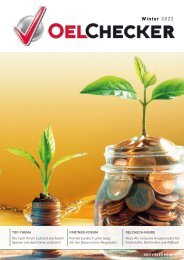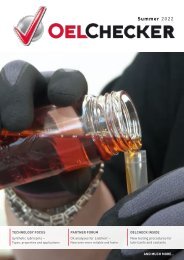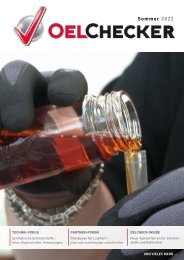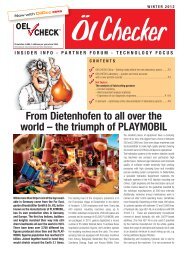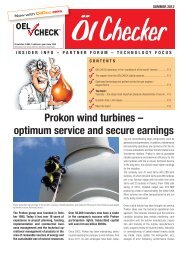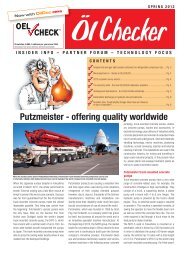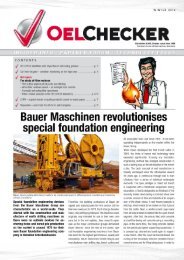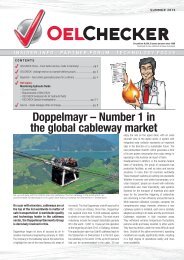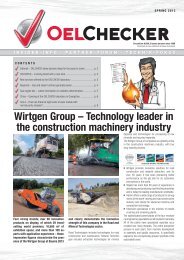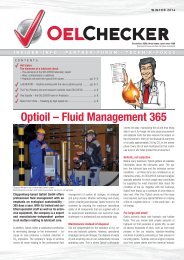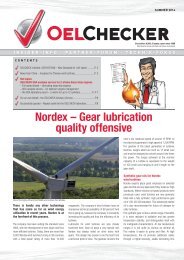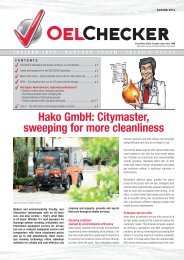OELCHECKER Winter 2022 - English
> HOT TOPIC: Condition-based oil changes – save money and protect the environment > OELCHECK INSIDE: 2022 UN Climate Change Conference / GfT honours Peter Weismann / High-level visit from the USA > TECHNOLOGY: Focus AdBlue – A cleaning agent with no residual alcohol > OELCHECK INSIDE – ALL ANALYSES FROM A SINGLE SOURCE AdBlue – New all-inclusive analysis kits Fuels – Investigations pursuant to DIN now available for almost all types Coolants – New Ultra analysis kit for faults in the cooling system > OELCHECK PARTNER FORUM: Bayerische Regiobahn – Climate- and environmentally friendly travel > FAQ: The tribologists at OELCHECK – Their knowledge and tasks > OilDoc News: OilDoc Conference & Exhibition / Seminar highlights
> HOT TOPIC: Condition-based oil changes – save money and protect the environment
> OELCHECK INSIDE: 2022 UN Climate Change Conference / GfT honours Peter Weismann /
High-level visit from the USA
> TECHNOLOGY: Focus AdBlue – A cleaning agent with no residual alcohol
> OELCHECK INSIDE – ALL ANALYSES FROM A SINGLE SOURCE
AdBlue – New all-inclusive analysis kits
Fuels – Investigations pursuant to DIN now available for almost all types
Coolants – New Ultra analysis kit for faults in the cooling system
> OELCHECK PARTNER FORUM: Bayerische Regiobahn – Climate- and environmentally friendly travel
> FAQ: The tribologists at OELCHECK – Their knowledge and tasks
> OilDoc News: OilDoc Conference & Exhibition / Seminar highlights
Create successful ePaper yourself
Turn your PDF publications into a flip-book with our unique Google optimized e-Paper software.
<strong>Winter</strong> <strong>2022</strong><br />
HOT TOPIC<br />
Condition-based oil changes – save<br />
money & protect the environment<br />
PARTNER FORUM<br />
Enjoy environmentally friendly<br />
travel with Bayerische Regiobahn<br />
OELCHECK INSIDE<br />
New all-inclusive analysis kits for<br />
fuels, coolants and AdBlue<br />
AND MUCH MORE...
“<br />
CHECK-UP<br />
Fed up with never-ending crises and political turmoil? You won’t find them here!<br />
Back in 2011, Dr Markus Söder, Bavarian State Minister for the Environment and Health,<br />
confirmed that waste through oil analyses should be avoided in his welcoming address<br />
to the first OilDoc Conference & Exhibition. In light of recent events, we’ve once again<br />
taken the initiative and turned to the government for support. When it comes to carbon<br />
emissions and cost savings, we believe it’s high time to raise awareness among consumers<br />
as well as machine and lubricant manufacturers of the role that oil analyses<br />
can play in the areas of sustainability, waste avoidance and reducing our carbon footprint.<br />
The first step in doing so was contacting members of the Bavarian Parliament from Alliance<br />
90/The Greens and the Christian Social Union in Bavaria (CSU) with the following<br />
information:<br />
■ In Germany, over 900,000 tonnes of lubricants and operating materials are consumed<br />
each year.<br />
■ More than 25% – over 200 million litres – of this enormous amount could be saved if oils<br />
were only changed when necessary.<br />
■ The effects of only changing oils when necessary speak for themselves. In addition<br />
to consumers enjoying lower costs for fresh oils, fewer transports of fresh and<br />
used oil would be required. This, in turn, would lead to lower waste of resources<br />
when collecting and processing waste oils and significantly lower CO 2<br />
emissions.<br />
■ These positive effects could be achieved easily. Users who consume more than 200<br />
litres of oil each year to operate their machines, systems or fleets should be required<br />
to provide proof and have the oil analysed prior to a scheduled oil change.<br />
The oils should only be replaced once the analysis data is available – and depending<br />
on their condition rather than after a fixed interval. OELCHECK can prove that oil<br />
change intervals can often be extended up to ten times the original recommendation<br />
based on more than four million samples tested, sent to our laboratory for analysis<br />
by over 40,000 customers over the last thirty years.<br />
Our proposal immediately caused a stir, as shortly afterwards we entered into personal<br />
discussions with members of the CSU and Alliance 90/The Greens and provided them<br />
with detailed information via video conference. We were promised the issue would be<br />
discussed in the Economic and Environmental Committees and the options offered by<br />
longer oil change intervals would be referred to in publications focusing on CO 2<br />
and<br />
cost savings.<br />
Alliance 90/The Greens (from left to right) during a visit to Brannenburg:<br />
Dr Christoph Rohbogner (Head of Tribology), Peter<br />
Weismann (Advisory Board), Paul Knoblach and Claudia Köhler<br />
(Members of the Bavarian Parliament), Paul Weismann (Managing<br />
Director)<br />
CONTENTS<br />
We’re yet to make great strides in the short term, but we have succeeded in raising awareness<br />
of the issue. We hope we’ll be able to achieve a bit more today than with our 2011<br />
initiative due to changed environmental behaviour among companies and consumers as<br />
well as increased cost pressures. This time we’ll be sure to keep up the good work!<br />
”<br />
Paul Weismann Barbara Weismann<br />
■ HOT TOPIC<br />
Condition-based oil changes – save money and protect the environment......................3-4<br />
■ OELCHECK INSIDE<br />
<strong>2022</strong> UN Climate Change Conference / GfT honours Peter Weismann /<br />
High-level visit from the USA..............................................................................................5-6<br />
■ TECHNOLOGY FOCUS AdBlue – A cleaning agent with no residual alcohol....................... 7<br />
■ OELCHECK INSIDE – ALL ANALYSES FROM A SINGLE SOURCE<br />
AdBlue – New all-inclusive analysis kits.............................................................................. 8<br />
Fuels – Investigations pursuant to DIN now available for almost all types....................... 9<br />
Coolants – New Ultra analysis kit for faults in the cooling system....................................11<br />
■ OELCHECK PARTNER FORUM<br />
Bayerische Regiobahn – Climate- and environmentally friendly travel............................12<br />
■ FAQ The tribologists at OELCHECK – Their knowledge and tasks ................................... 13<br />
■ OILDOC NEWS OilDoc Conference & Exhibition / Seminar highlights........................ 14-15<br />
Published by:<br />
OELCHECK GmbH Kerschelweg 28 · 83098 Brannenburg ·<br />
Germany info@oelcheck.de · www.oelcheck.de<br />
Concept and text: OELCHECK GmbH · Astrid Hackländer<br />
Typesetting and design: Agentur Segel Setzen, Petra Bots,<br />
www.segel-setzen.com<br />
Image rights:<br />
OELCHECK GmbH · XX · OilDoc GmbH · Adobe Stock |<br />
Romolo Tavani | BazziBa<br />
© <strong>2022</strong> OELCHECK GmbH<br />
All rights reserved. Reproduction only upon approval!<br />
2
HOT TOPIC: SAVE MONEY &<br />
PROTECT THE ENVIRONMENT<br />
CONDITION-BASED OIL CHANGES<br />
SAVE MONEY AND PROTECT THE ENVIRONMENT<br />
Protecting the climate and saving energy and resources are topics that are right on trend. Almost every company is<br />
working hard to reduce its carbon footprint. Meanwhile, returning a profit is becoming increasingly difficult, with<br />
manufacturing costs having only gone up in recent months. Savings are on everyone’s agenda wherever possible,<br />
and all operational processes are being put in the spotlight. However, too little attention is often paid to lubricants.<br />
Even if higher-quality premium lubricants are used for the first time, they are often replaced far too early due to the<br />
fact that they have always been changed at fixed intervals or because it has been stipulated by the oil supplier. When<br />
monitored using OELCHECK all-inclusive analysis kits, however, lubricants can be changed based on their actual<br />
condition. At the same time, the systems’ operational safety is ensured as the analyses also detect contaminants and<br />
any wear processes. This means the cost-effective analyses pay for themselves in short time.<br />
© Adobe Stock<br />
If oils are changed based on their condition instead of at fixed intervals,<br />
you’ll be doing your bit for the environment. Fewer oil changes<br />
mean the following:<br />
■ Less need for fresh oil<br />
■ Less oil extraction and crude oil transport<br />
■ Fewer energy-intensive refinery processes<br />
■ Less transport of fresh and used oils<br />
■ Less reprocessing or disposal of used oils<br />
The bottom line is that fewer oil changes reduce the formation of CO 2<br />
.<br />
The production and disposal of lubricants alone creates CO 2<br />
emissions<br />
of approximately 1.5kg CO 2<br />
per litre of oil*.<br />
However, fewer unnecessary oil changes also have an additional effect<br />
that should not be underestimated, particularly in today’s climate –<br />
they have a positive effect on the cost balance sheet. We illustrate the<br />
amounts involved using two practical examples.<br />
3MW wind turbine – Main gearbox<br />
The components in a wind turbine are hard to access. Inspections,<br />
maintenance work and oil changes take place at high altitudes, and<br />
components failing result in long interruptions to operations. Changing<br />
the oil just once costs several thousand euros.<br />
Components in a wind turbine require a range of different lubrication<br />
oils, greases and coolants. To clarify the cost-benefit balance of condition-dependent<br />
oil changes, which are accompanied by OELCHECK<br />
oil analyses, only the 1,100 litres of synthetic gear oil that lubricate<br />
the planetary gear of a 3MW system have been taken into account in<br />
the example.<br />
Analyses of the gear oil carried out every six months in the OELCHECK<br />
laboratory have shown that the gear oil’s service life can be doubled<br />
from 30,000 operating hours (5-6 years) to 60,000 operating hours<br />
(10-12 years).<br />
Component: Planetary gear of a 3MW wind turbine<br />
Gear oil type: Synthetic CLP gear oil ISO VG 320<br />
Oil volume: 1,100L<br />
Costs per litre of gear oil: Approx. €9.50<br />
Costs for changing the gear oil after 30,000 operating hours<br />
Fixed interval; no oil analysis costs<br />
Gear oil €10,500<br />
+ Loss of production (3MW * €0.2 * 6 hours) €3,600<br />
+ Service technician (external)* €1,500<br />
Total €15,600<br />
Costs for changing the gear oil after 60,000 operating hours<br />
based on 12 OELCHECK all-inclusive analyses<br />
Gear oil €10,500<br />
+ Loss of production (3MW * €0.2 * 6 hours) €3,600<br />
+ Service technician (external)* €1,500<br />
+ 12 x OELCHECK analysis kits (approx. €80/kit per year) €960<br />
+ 12 x 2-hour service technicians €80/hour for sampling* €1,920<br />
Total €18,480<br />
Savings on an oil change after 60,000 operating hours instead of<br />
30,000 operating hours<br />
Total costs for two oil changes every 30,000 operating<br />
hours<br />
/ Total costs including oil analyses after 60,000 operating<br />
hours + service technician (external)*<br />
Cost savings after 60,000 operating hours (10 years)<br />
Annual cost reduction<br />
Initial situation<br />
€31,200<br />
€18,480<br />
€12,720<br />
Approx.<br />
€1,000<br />
* Values are approximate and rounded.<br />
3
HOT TOPIC: SAVE MONEY &<br />
PROTECT THE ENVIRONMENT<br />
© Adobe Stock<br />
Goods vehicles – Euro 6D six-cylinder diesel engine<br />
A well-known German freight forwarder is leading the way in reducing<br />
their CO 2<br />
emissions. They have around 150 trucks on their books<br />
that run solely on biodiesel (B100), which reduces CO 2<br />
emissions by<br />
around 80% compared to running on diesel (B7). With an average<br />
consumption of 33 litres per 100 kilometres and a mileage of around<br />
120,000 kilometres per year, each heavy goods vehicle emits 70<br />
tonnes less CO 2<br />
each year.<br />
Unfortunately, there’s a catch. Several years of findings relating to<br />
running engines on pure, non-esterified rapeseed oil indicate that<br />
engine manufacturers still stipulate that B100 engine oils should be<br />
changed at shorter intervals. This should eliminate the risk of increased<br />
fuel entry when running on B100 and of any resulting subsequent<br />
damage to the engine.<br />
To meet the engine manufacturer’s warranty conditions as defined<br />
in the lease contracts, the freight forwarder had to shorten the<br />
oil change intervals from the usual 120,000 kilometres to 30,000<br />
kilometres.<br />
Shortening the intervals led the cost accounts for oil changes and<br />
the CO 2<br />
balance sheet to soar due to the following:<br />
■ The amount of used and fresh oil increased four-fold<br />
■ The costs for changing the oil and the associated downtime quadrupled<br />
■ Additional, avoidable CO 2<br />
emissions generated during the production,<br />
transport and disposal of engine oils<br />
Based on the initial situation, the freight forwarder and OELCHECK<br />
launched a trial in collaboration with the truck manufacturer.<br />
Components:<br />
Four Euro 6D six-cylinder diesel engines in long-haul trucks<br />
Engine oil type:<br />
SAE 5W-30 based on polyalphaolefin and ester; meets the specifications<br />
ACEA E4, E6, E7, E9; API CJ-4; JASO DH-2<br />
Oil volume: 41.5L per engine<br />
Costs for changing the engine oil<br />
Initial situation<br />
Includes fresh oil, oil filter and labour<br />
According to the freight forwarder’s specifications €500<br />
As part of the test, the engine oils in the four trucks with Euro 6D<br />
six-cylinder diesel engines were analysed in the OELCHECK lab every<br />
5,000 kilometres. The limit values of the individual parameters were<br />
agreed with the vehicle manufacturer in advance. In this light, the following<br />
values came under particular scrutiny in the OELCHECK lab:<br />
any B100 fuel entry into the engine oils, a change in viscosity, oil oxidation<br />
and wear parameters. The short analysis intervals of 5,000 kilometres<br />
acted as a safeguard so we could intervene at short notice<br />
should serious deviations be detected and therefore avoid significant<br />
damage to the engines.<br />
In all four trucks, the engine oils reached the 30,000-kilometre milestone<br />
– the point at which an oil change would otherwise have been<br />
due, according to the manufacturer’s instructions – without presenting<br />
any issues. The oil quality also returned good results at that point.<br />
The oil showed signs of ageing in the following 30,000 kilometres (up<br />
to 60,000 kilometres). However, this proved to be within scope. As<br />
expected, the fuel content in the oil increased throughout the test.<br />
The fuel entry was only proven to be moderate in all four vehicles<br />
observed, and the viscosity did not change as a result. The limit values<br />
agreed with the manufacturer were never reached, while wear<br />
metals could only be detected in low concentrations.<br />
The analysis data showed that the vehicles’ oil should be changed every<br />
90,000 kilometres. To be on the safe side, however, the vehicle<br />
manufacturer involved in the test approved extended oil service intervals<br />
of up to 65,000 kilometres based on the data established for<br />
the haulage vehicles used in long-haul transport.<br />
Saving per truck with an extended oil change interval after 90,000<br />
operating hours<br />
Previous costs for two oil changes every 60,000<br />
kilometres2 x €500<br />
/ Current costs for an extended oil change interval<br />
after 60,000 kilometres<br />
€1,000<br />
€500<br />
Annual cost savings per truck €500<br />
4<br />
The freight forwarder, which runs over 150 vehicles on biodiesel<br />
(B100), would save over €75,000 in engine oil costs per year due to<br />
tripling the oil change intervals as determined by the oil analyses. In<br />
addition to the cheaper biodiesel costs, the forwarder would secure a<br />
much more favourable cost structure in the much-discussed freight<br />
forwarding industry as well as a better CO 2<br />
balance.
INSIDE OELCHECK<br />
<strong>2022</strong> UN CLIMATE CHANGE CONFERENCE<br />
INTERVIEW WITH PAUL WEISMANN IN THE KLEENOIL PANOLIN AG VIDEO<br />
Taking effective measures to protect the climate is becoming increasingly<br />
urgent. In this context, the Vision 2045 project showed<br />
new paths to an all-round sustainable future at the UN Climate<br />
Change Conference held in Sharm el-Sheikh in November <strong>2022</strong>. The<br />
three-day summit saw international business and industrial leaders<br />
exchange ideas and present business approaches with a positive<br />
impact on our planet’s future. Mr Milorad Krstic represented<br />
one of fifty innovative, medium-sized companies selected by the organisers.<br />
He has been Chair of the Board of KLEENOIL PANOLIN AG<br />
and a pioneer in his entrepreneurial field since 1986. In his presentation,<br />
he shed some light on the positive effects of microfiltration<br />
technology and durable, rapidly biodegradable oils. A unique company<br />
video was also filmed ahead of the conference to discuss the<br />
issue further, which also featured input from KLEENOIL PANOLIN<br />
AG’s long-standing partners.<br />
in Europe, for thirty years. This partnership means that users receive<br />
laboratory evaluations of the products used. The analyses are<br />
independent of the oil and machine manufacturers, and OELCHECK<br />
tribologists often include over 40 parameters in their diagnostics<br />
reports. We use high-quality analyses and our unique expertise to<br />
extend the service life of oils and help detect any damage to the lubricated<br />
components at an early stage. We ensure lubricants are used<br />
throughout our evaluations, which are independent of system and lubricant<br />
manufacturers. Doing so allows us to create the conditions<br />
to make a positive contribution to the CO 2<br />
balance over the long term.<br />
Paul Weismann, Managing Director of OELCHECK GmbH, explained<br />
why you would not be flying blind with the longer oil change intervals<br />
recommended by KLEENOIL thanks to regular laboratory analyses.<br />
KLEENOIL PANOLIN AG was one of the first companies to recognise<br />
the benefits of lubricant analyses, and has been working with<br />
OELCHECK, the leading laboratory for lubricant and fuel analyses<br />
THE ROSENHEIM HERBSTFEST<br />
We really missed this party! At the end of August, it was once again<br />
time to come together after the pandemic, as all OELCHECK staff<br />
were invited by the management – as is tradition – to attend the '<br />
Rosenheimer Wies’n on 27 August and have some fun.<br />
The Herbstfest is one of the best – and largest – folk festivals in<br />
Bavaria. Some aficionados even prefer it to Munich’s Oktoberfest,<br />
because you still get the family vibe and wholesome experience.<br />
With tables reserved in the Flötzinger tent (a private brewery based<br />
in Rosenheim), we were able to enjoy the cheerful, relaxed atmosphere<br />
and great food in traditional surroundings.<br />
A BUSY AUTUMN FOR OUR TRADE FAIR TEAMS<br />
Things really picked up in the autumn from September onwards. In<br />
Germany alone, we were present at five major international trade<br />
fairs. OELCHECK’s stand was a huge hit at each event, with customers<br />
and interested parties from around the world getting the chance<br />
to have all their questions about lubricant and operating fluid analyses<br />
answered. The new additions to our ever-expanding portfolio<br />
of all-inclusive analysis kits and services meant that a whole host<br />
of topics were covered, including delving into the technical details.<br />
Discussions with visitors focused on the options and benefits offered<br />
by all-inclusive analysis kits as well as our free web portal, LAB.RE-<br />
PORT, and our handy OELCHECK App 4.0.<br />
We were so busy our trade fair teams hardly had time to breathe! The<br />
events focused on a range of fields:<br />
■ Lubricant Expo, Essen, 6-8 September. The new event in Germany<br />
was aimed at trade visitors across all industries in which<br />
lubricants play a role.<br />
■ InnoTrans, Berlin, 20-23 September. InnoTrans, the international<br />
trade fair for transport technology in Berlin with a spotlight<br />
on the world of railway technology and infrastructure.<br />
■ WindEnergy, Hamburg, 26-30 September. As the name<br />
suggests, in Hamburg everything revolved around using wind<br />
power to generate energy and how it can be used.<br />
■ bauma, Munich, 24-30 October. Just an hour away from<br />
OELCHECK, bauma is the key event for the construction, building<br />
materials and mining machinery industry worldwide.<br />
■ Energy Decentral/EuroTier, Hanover, 15-18 November. A large<br />
exhibition of state-of-the-art processes and technical solutions<br />
for making the best use of local, renewable energy sources.<br />
The busy autumn trade fair season drew to a close in November. However,<br />
we’ll be back on the road in spring 2023, as we head to nextlube<br />
in Düsseldorf (18-19 April) and then on to the OilDoc Conference &<br />
Exhibition in Rosenheim (9-11 May).<br />
5
INSIDE OELCHECK<br />
PETER WEISMANN<br />
MEMBER OF GESELLSCHAFT FÜR<br />
TRIBOLOGIE E.V. (GFT) FOR FIFTY YEARS<br />
Peter Weismann was honoured at the GfT Conference in Göttingen<br />
in September <strong>2022</strong> for his fifty-year membership of the GfT<br />
with an award that, to date, only a handful of others have received.<br />
This means that OELCHECK’s founder, who has spent the last fifty<br />
years working as a tribologist, is also one of the longest-serving<br />
members of Gesellschaft für Tribologie e.V.<br />
During his studies focused on mechanical engineering, Peter Weismann<br />
was fascinated by lubricants and the teaching surrounding<br />
friction and wear. As part of his thesis, in 1972 he developed a test<br />
bench to recover oil in oil-mist lubrication at the former Hoesch Stahl<br />
AG plant in Dortmund. Optimised back-misting nozzles allowed the<br />
oil content to be reduced in any air escaping by more than 60 %. This<br />
represented a huge step forwards in protecting the environment and,<br />
above all, employees’ well-being. Even back then, Peter took a sustainable<br />
approach to everything he did, even though talk of ’sustainability’<br />
was just as rare as ’tribology’.<br />
After finishing his studies, he held management positions in sales departments<br />
in the mineral oil industry before laying the foundations for<br />
OELCHECK GmbH as we know it with his wife, Barbara, in 1991. The<br />
company has since become a recognised market leader in lubricant<br />
and operating fluid analyses in Europe, and Peter is still involved at almost<br />
75 years of age. As Technical Director (on the Advisory Board), he<br />
is a key driving force behind both OELCHECK GmbH and the sustainable<br />
use of lubricants. In October of this year, members of Alliance 90/<br />
The Greens visited the OELCHECK laboratory in Brannenburg to learn<br />
about his initiative on waste caused by changing oils following rigid<br />
specifications set by oil and machine manufacturers.<br />
Presentation of honorary certificate during the GfT Conference <strong>2022</strong><br />
However, if oils are monitored using oil analyses on a regular basis<br />
before they are changed, the oils can normally continue to be used<br />
without a second thought. Fewer unnecessary oil changes has the<br />
following benefits:<br />
■ Less need for fresh oil – and therefore lower costs<br />
■ Less oil extraction<br />
■ Fewer energy-intensive refinery processes<br />
■ Less transport of fresh and used oils<br />
■ Less repeat refining or combustion of used oils<br />
■ Significantly lower CO 2<br />
emissions overall<br />
Less can be so much more!<br />
To protect our planet, we all need to take a<br />
critical look at our behavioural patterns and<br />
be ready for change, both in our private and<br />
professional lives. We should limit our use of<br />
the Earth’s resources wherever and whenever<br />
possible. Saving lubricants and operating<br />
fluids that can still be used is just one small<br />
piece of the puzzle, but an important one<br />
nonetheless – and with far-reaching effects.<br />
DON’T GIVE FIRE A CHANCE!<br />
Safety first! All OELCHECK employees recently underwent training exercises for extinguishing<br />
a fire. The training covered general safety instructions, such as what to do<br />
in the event of a fire as well as escape and rescue routes, and how to handle fire extinguishers.<br />
Employees then had a practical fire-extinguishing exercise on their agenda.<br />
An additional evacuation exercise meant employees faced a race against time to<br />
evacuate. Staff had to leave our three buildings in an organised fashion as quickly<br />
as possible. The first members of staff arrived at the assembly point after just 25<br />
seconds, and everyone had evacuated after 1 minute 45 seconds.<br />
HIGH-LEVEL VISIT FROM THE USA<br />
Kazushige Yokoyama is Professor of Organic Chemistry and Physical Chemistry at Geneseo – The<br />
State University of New York. Founded in 1871, Geneseo is one of the leading public universities for<br />
humanities in the United States. In autumn <strong>2022</strong>, Professor Yokoyama attended a trade conference in<br />
Germany and stopped off in Brannenburg to meet one of his former students.<br />
6<br />
Paul Weismann attended Professor Yokoyama’s lectures during his chemistry studies in the United<br />
States (2000-2004) and had fond memories of him. After all, Professor Yokoyama successfully nominated<br />
Paul Weismann for the Chancellor’s Award for Student Excellence in 2004. This award recognises<br />
students who have proven that they can combine academic excellence with leadership qualities,<br />
sport, professional achievements, charitable work, or the creative and performing arts. As the only<br />
European on the team, Paul captained the College Ice Hockey Team from 2002 to 2004. Both men were<br />
delighted to see each other again, catch up on old times and discuss the latest developments in the<br />
OELCHECK laboratory.
TECHNOLOGY FOCUS<br />
ADBLUE<br />
A CLEANING AGENT WITH NO RESIDUAL ALCOHOL<br />
© Adobe Stock<br />
It goes without saying that the idea of 32.5% urea in one litre of fluid doesn’t sound appealing. AdBlue is produced<br />
purely industrially while human urine, on the other hand, is anything but clean. It contains 3-4% urea,<br />
protein, other impurities – and often, residual alcohol, too.<br />
Lower emissions and lower diesel consumption<br />
Characteristics at a glance<br />
© Adobe Stock<br />
However, it was precisely because of the sanitary connotations that<br />
the name AdBlue came into being. In principle, the name AdGreen<br />
would be a better description for the role of the concentrate. After<br />
all, AdBlue is key to reducing NOx emissions in the commercial vehicle<br />
sector and in diesel cars.<br />
The urea injected into the exhaust dissolves into ammonia and very small<br />
quantities of carbon dioxide (CO 2<br />
) in the hot exhaust gas. The ammonia<br />
forms a compound with nitrogen oxides in the catalytic converter when<br />
exposed to heat. This produces nitrogen and water vapour, both natural<br />
components of the atmosphere and therefore completely harmless in the<br />
exhaust gas. This reaction is known as selective catalytic reduction (SCR).<br />
For vehicles, the urea solution is the storage or transport form for ammonia,<br />
which can also be used directly to reduce NOx in the SCR catalytic<br />
converter in stationary systems.<br />
Using this technology offers a way to reduce pollutants in diesel engines,<br />
which ’suffer’ from the NOx particle trade-off due to combustion.<br />
Depending on the design, the engine generates either more NOx<br />
and fewer tiny soot (particles), or less NOx and more soot (particles).<br />
Both require an effective after-treatment process for exhaust gases.<br />
While the requirements of the Euro 5 emissions standard could still<br />
be fulfilled using internal engine measures (such as recirculating exhaust<br />
gases) and a diesel particulate filter, the emissions standard<br />
requires the use of an SCR system with AdBlue from Euro 6 onwards.<br />
Using an SCR system with AdBlue means that engines can be used<br />
differently, the soot quantity can be reduced over the entire operating<br />
range, the load points can be improved and, in addition to reducing<br />
NOx, fuel savings of up to 6 % can be achieved.<br />
This technology reduces the nitrogen oxides in the diesel exhaust<br />
gases emitted by commercial vehicles by 85 % for Euro 5 and by<br />
95-98 % for Euro 6 – and that’s all down to an AdBlue system. If a<br />
vehicle is equipped with such a system, however, it won’t run without<br />
AdBlue, as the engine won’t start if AdBlue is not present. And<br />
there is also a fiscal reason for this, too, as incorrect exhaust gas<br />
after-treatment would constitute tax evasion.<br />
AdBlue is a registered trademark of the German Association of the<br />
Automobile Industry (VDA (Verband der Automobilindustrie e.V.)).<br />
Outside Germany, designations such as DEF (Diesel Exhaust Fluid)<br />
and AUS 32 (Aqueous Urea Solution) are also used.<br />
The quality requirements for the product are set out in ISO Standard<br />
22241-1. The pure urea content must be 32.5%. A higher concentration<br />
of 40 % (AUS 40) is required pursuant to ISO Standard 18611 for<br />
use in the large engine sector (marine or engine power plants).<br />
Substances other than pure water and dyes are not permitted in Ad-<br />
Blue. Elements such as calcium and aluminium may only be present<br />
in very small traces. Under no circumstances may AdBlue be contaminated<br />
with non-ferrous metals such as zinc, copper or nickel,<br />
or elements such as sulphur, sodium or potassium. SCR catalytic<br />
converters are sensitive to what are known as catalyst poisons, and<br />
contaminated AdBlue significantly reduces a catalytic converter’s<br />
service life.<br />
The transparent liquid is non-flammable and non-toxic, but may irritate<br />
the eyes, skin and respiratory tract. You should therefore rinse<br />
your skin under plenty of water if it comes into contact with AdBlue.<br />
Furthermore, AdBlue is corrosive to steel, iron, nickel and non-ferrous<br />
metals, while paints and plastics can be damaged by prolonged<br />
exposure.<br />
Shelf life and storage<br />
AdBlue’s shelf life depends primarily on the temperature and the<br />
circumstances in which it is stored. AdBlue can be stored for around<br />
18 months at a storage temperature of -5 °C to +25 °C. It should be<br />
noted, however, that prolonged storage above 25 °C may cause the<br />
urea to decompose. If AdBlue is stored at temperatures above 30 °C,<br />
its shelf life is significantly reduced.<br />
The following apply as a general rule of thumb: The storage stability<br />
decreases by six months for every 5 °C over 30 °C. If the product is<br />
still used at some point, this may result in damage to the catalytic<br />
converter system and the engine.<br />
AdBlue freezes from -11 °C, but can be used once it has thawed out.<br />
A word of caution, though: AdBlue expands like water in frosty conditions<br />
and may cause containers to burst.<br />
Demand for AdBlue has soared to extreme levels. Whereas a diesel<br />
car consumes only 1.5 to 2.8 litres every 1,000 kilometres, a commercial<br />
vehicle requires around 5 % – and large engines even up<br />
to 10% – of the diesel requirement in AdBlue. This equates to an<br />
estimated total consumption of AdBlue of between 2.5 and 5 million<br />
litres per day in Germany alone.<br />
In principle, AdBlue should be kept out of direct sunlight and not<br />
stored at extreme temperatures. The containers must be well<br />
sealed to prevent dirt from penetrating and prevent the product<br />
from concentrating due to evaporation.<br />
7
OELCHECK – ALL ANALYSES FROM A SINGLE SOURCE<br />
OELCHECK offers all-inclusive analyses from a single source for all product<br />
groups, whether it’s oils, lubricating greases, fuels, coolants or AdBlue. This<br />
means customers not only benefit from the expertise of the market leader, but<br />
also have a single point of contact for all the investigations they require.<br />
ADBLUE ALL-INCLUSIVE ANALYSIS KIT<br />
AdBlue is the technical prerequisite for operating<br />
modern diesel engines with exhaust gas<br />
after-treatment systems. However, selective<br />
catalytic reduction (SCR) catalytic converters,<br />
in particular, are highly sensitive to ’contaminated<br />
or unclean AdBlue’. To avoid any potential<br />
damage, urea solutions of the highest purity and<br />
quality are required. However, these are not always<br />
available in the current climate. To ensure that operators remain<br />
on the safe side, four new OELCHECK all-inclusive analysis<br />
kits will be available for AdBlue from January 2023.<br />
The manufacturing of AdBlue requires large quantities of ammonia.<br />
However, its production has severely slowed down since autumn<br />
2021 due to the sharp rise in the price of natural gas. This,<br />
in turn, has meant that less urea is available for AdBlue, which in<br />
itself is becoming increasingly scarce and more expensive. As a<br />
result, AdBlue of significantly lower quality is being sold, which is<br />
contaminated with foreign substances that may damage SCR catalytic<br />
converters. The injection can also be negatively impacted by<br />
such foreign substances. Deposits on the tip will affect the spray<br />
pattern, while catalytic productivity (turn-over number (TON)) in the<br />
SCR catalytic converter will fall. This, in turn, reduces the efficiency<br />
of the exhaust gas after-treatment system as a whole. In addition,<br />
the use or admixture of unsuitable urea (such as from fertiliser) can<br />
poison the catalytic converter.<br />
Quality control is more important than ever<br />
The strict quality requirements for AdBlue set out in ISO 22241-1 (or<br />
ISO 18611 for the marine sector) have been defined in consultation<br />
with the OEM. All operators of diesel engines with exhaust gas after-treatment<br />
systems, such as freight forwarders, municipalities,<br />
agricultural and forestry companies, railway companies, energy<br />
companies or shipping companies, benefit from complying with these<br />
requirements.<br />
We support all operators with our new all-inclusive analyses for Ad-<br />
Blue, which provide valuable services for incoming goods inspections<br />
(delivery samples), for sampling campaigns for fleets and fuel<br />
depots as well as for verifying any mixtures.<br />
AdBlue analysis kits at a glance<br />
Four all-inclusive analysis kits will be available from January 2023.<br />
They vary in the scope in terms of the investigations they contain.<br />
■<br />
■<br />
■<br />
■<br />
The analysis kit 1AB provides base values such as urea concentration,<br />
pH value, density and the amount of insoluble foreign<br />
substances.<br />
The 2AB kit also detects elements using ICP and therefore detects<br />
potential catalyst poisons, such as coloured and/or alkali<br />
or earth alkali metals.<br />
The 3AB kit also measures alkalinity.<br />
The all-inclusive analysis kit 4AB is used to check all key data<br />
pursuant to ISO 22241-1, including the contents of aldehydes<br />
and biuret.<br />
We require a quantity of 1 litre to analyse AdBlue. OELCHECK PETG<br />
sample containers are available.<br />
Alternative vessels should not be used, and under no circumstances<br />
should metal, aluminium or glass containers be used. Metals tend<br />
to corrode and glass, with its high silicon value, is leached by Ad-<br />
Blue to return false lab results.<br />
TEST RESULT/PROCEDURE 1AB 2AB 3AB 4AB<br />
8<br />
Refractive index at 20°C ü ü ü ü<br />
Urea content ü ü ü ü<br />
Insoluble ü ü ü ü<br />
Density (20°C) ü ü ü ü<br />
pH value (25°C) ü ü ü ü<br />
Elements Phosphate (PO4), calcium, iron, copper, zinc, chromium,<br />
nickel, aluminium, magnesium, sodium, potassium<br />
ü ü ü<br />
Alkalinity (NH3) ü ü<br />
Aldehydes<br />
ü<br />
Biuret<br />
ü
INSIDE OELCHECK<br />
Ideally equipped for testing AdBlue<br />
The OELCHECK laboratory is better equipped to analyse lubricants<br />
and operating fluids than almost any other lab worldwide. For years,<br />
we have specialised in researching coolants and more. AdBlue<br />
analyses now also benefit from our expertise in this field. That said,<br />
our extensive, existing equipment fleet for coolants had to be expanded<br />
to allow us to handle the increasing number of AdBlue and<br />
coolant samples in the future. In addition, we also added an entirely<br />
new device: a Perkin Elmer Lambda 365+ spectrophotometer.<br />
We use the new spectrophotometer to determine the levels of aldehydes<br />
and biuret in the AdBlue. Both should only be present in<br />
traces. Under certain operating conditions in the catalytic converter<br />
(temperatures below 300 °C), aldehydes can react with ammonia<br />
when water is separated to form hydrocyanic acid. The release of<br />
such a toxic compound is prevented by ensuring the relevant monitoring<br />
takes place. Biuret also has negative properties. An ageing<br />
product of urea, it is – from a chemistry perspective – a dimer<br />
formed by the release of ammonia. This increases the alkalinity of<br />
the solution and can lead to it being incompatible with the fluids<br />
used in the supply circuit. In addition, when heated to above 188 °C,<br />
biuret breaks down into melamine and cyanuric acid. The latter<br />
decomposes to become cyanic acid, another highly toxic compound<br />
whose release should be prevented, under the conditions present in<br />
the SCR catalytic converter during a violent reaction.<br />
During the examination, the spectrophotometer uses a substance’s<br />
’colour fingerprint’. Polychromatic light is broken down into monochromatic<br />
light by a prism for the measurement to be taken. The<br />
sample to be measured is irradiated in a cuvette with monochromatic<br />
light and a quantitative statement about defined analytes can<br />
be made based on the absorbance level measured. Aldehydes, for<br />
example, form a coloured complex compound in a sulphuric acid<br />
solution by reacting with chromotropic acid, which absorbs light at<br />
565 nm (violet). The colour complex is measured using the spectrophotometer<br />
at 565 nm and converted to an aldehyde concentration<br />
using a calibration curve. Biuret develops a purple-coloured complex<br />
with a maximum absorption of 550 nm in an alkaline solution<br />
in the presence of potassium sodium tartrate with bivalent copper.<br />
Got any questions about the new OELCHECK all-inclusive analysis kits for AdBlue?<br />
Contact us by email at sales@oelcheck.de or by phone on +49 (0)803 49 04 72 50!<br />
FUEL ALL-INCLUSIVE ANALYSIS KIT<br />
© Adobe Stock<br />
OELCHECK is expanding its range with new all-inclusive analyses<br />
for almost all types of fuel. We have partnered with ASG Analytik-Service<br />
AG to bring to market all-inclusive analysis kits for<br />
petrol, synthetically produced e-fuels, EL heating oil and aviation<br />
and marine fuels from January 2023. All tests included shall be<br />
carried out pursuant to the applicable specifications set out by the<br />
DIN, ISO or ASTM standards. And this also applies to diesel, too.<br />
By expanding our range, OELCHECK now offers all-inclusive analyses<br />
from a single source, whether you need to analyse oils, lubricating<br />
greases, fuels, coolants or AdBlue.<br />
Joining forces with ASG<br />
OELCHECK continues its tradition of analysing fuels in its own laboratory<br />
in Brannenburg (Upper Bavaria). Some parameters, however,<br />
are now also being examined by our partner ASG. OELCHECK<br />
has entered into a new partnership with ASG to this end. Founded<br />
in 1992, Analytik-Service GmbH (and since 2021, Analytik-Service<br />
AG; ASG for short) is a DAkkS-accredited testing laboratory for fuel<br />
analyses based in Neusäß, near Augsburg. They have focused on<br />
both fossil fuels and renewables from the very beginning. Alongside<br />
standard and special analyses for liquid, solid and gaseous motor<br />
and heating fuels, their portfolio also includes the manufacture of<br />
test fuels and quality assurance materials.<br />
9
Fuel analysis kits at a glance<br />
The DIN, ISO or ASTM standards define the requirements – depending<br />
on the product – for the quality of the fuels as well as for checking<br />
their quality. OELCHECK will offer comprehensive analyses for<br />
the following product groups as from January 2023:<br />
■<br />
■<br />
Petrol<br />
Complete scope of analysis pursuant to DIN EN 228.<br />
For unleaded petrol. Also with the addition of up to 10 % ethanol,<br />
such as in Super E5, Super E10 and Super Plus.<br />
Diesel fuels<br />
Complete scope of analysis pursuant to DIN EN 590.<br />
For conventional fossil diesel fuels. Also with the addition of up<br />
to 7 % biodiesel, such as in B7.<br />
Note: Diesel fuel containing biodiesel may be contaminated by<br />
bacteria. These multiply in the area between the fuel and water<br />
resting at the bottom of the tank. Frequently blocked fuel filters<br />
and lines, sludge-like deposits in the tank and the loss of engine<br />
performance are typical signs of diesel being infested with bacteria.<br />
OELCHECK’s additional test for contamination provides a<br />
quick, clear answer as to whether bacteria have formed in the<br />
fuel.<br />
■<br />
GTL Gas-to-Liquids Fuel is an alternative synthetic diesel fuel<br />
produced using natural gas. It burns far cleaner than conventional<br />
diesel and emits significantly less dust and nitrogen oxide. GTL<br />
has a high cetane number (75-80) and therefore boasts higher<br />
combustibility and better combustion quality than fossil diesel.<br />
Where CO 2<br />
is used instead of natural gas as a carbon source to<br />
build up the hydrocarbons, this is referred to as e-diesel. This is,<br />
in fact, carbon-neutral, as the CO 2<br />
needed can be extracted from<br />
the air or separated during an industrial process. This means<br />
that no ’new’ CO 2<br />
is released from fossil sources, and the ’existing’<br />
CO 2<br />
can be reused in a circular process.<br />
HVO is based on hydrogenated vegetable oils, which are converted<br />
into hydrocarbons using a catalytic reaction with the addition<br />
of hydrogen. This is what is known as a second-generation biofuel.<br />
The result is a 100 % fossil-free diesel product made only from<br />
renewable raw materials. Using HVO, an engine’s CO 2<br />
emissions<br />
can be reduced by 65-90 % compared to conventional diesel.<br />
EL heating oil<br />
Complete scope of analysis pursuant to DIN 51603-1.<br />
For conventional EL heating oil and low-sulphur EL heating oil.<br />
■<br />
Synthetic diesel fuels<br />
Complete scope of analysis pursuant to DIN EN 15940.<br />
For synthetic diesel fuels HVO and GTL.<br />
E-fuels<br />
1.4 billion cars and a huge number of commercial vehicles with<br />
internal combustion engines remain on the road around the<br />
world. Even though a vehicle’s largest CO 2<br />
emissions throughout<br />
its life cycle occur during production, it should be powered<br />
by alternative, carbon-neutral fuels where possible. E-fuels or<br />
synthetic fuels are increasingly the fuel of choice to move the<br />
running of such vehicles away from fossil fuels. Both e-fuels<br />
and synthetic fuels are expected to play an increasingly important<br />
role in protecting the planet, and as such OELCHECK is offering<br />
all-inclusive analyses for synthetic diesel fuels.<br />
Synthetic fuels are chemically produced or synthesised and can,<br />
in principle, originate from different sources.<br />
■<br />
■<br />
■<br />
AvTur<br />
Complete scope of analysis pursuant to ASTM D1655.<br />
For aviation fuel for jet aircraft, turboprop jets and helicopters.<br />
Marine fuels / Distillate fuels<br />
Complete scope of analysis pursuant to ISO 8217.<br />
For marine fuels in classes DM or DF.<br />
These middle distillates are comparable to EL heating oil and<br />
diesel fuel. They are used in engines on cruise ships and inland<br />
waterway vessels.<br />
Marine fuels / Residual fuels<br />
Complete scope of analysis pursuant to ISO 8217.<br />
For marine fuels of the residual fuel type.<br />
Any leftover fuel from refinery processes is referred to as residual<br />
or heavy fuel oil. These residual fuels are mainly used in<br />
large marine engines.<br />
Sample quantities, containers and returns<br />
The fuel all-inclusive analysis kits come with aluminium sample<br />
bottles. Each container has a capacity of one litre. However, two litres<br />
are required for running a petrol analysis. These analysis kits<br />
therefore go out to customers with two one-litre bottles.<br />
It is essential to observe the following when filling:<br />
Please fill the sample bottles to the brim!<br />
There must be no free space present to allow the fuel to release<br />
vapours in the aluminium bottle. If space is present, we<br />
will be unable to determine the vapour pressure correctly in the<br />
laboratory.<br />
The new fuel all-inclusive analysis kits are valuable tools for incoming<br />
goods and overall quality control. They can also detect any<br />
contamination that may affect the operation of filters, injectors and<br />
other components. In practical terms, too, the principle of getting<br />
all your analysis kits from a single source simplifies the invoicing<br />
modalities and helps you maintain a clear overview of your costs.<br />
10
INSIDE OELCHECK<br />
ULTRA ALL-INCLUSIVE ANALYSIS KIT<br />
FOR FAULTS IN THE COOLING SYSTEM<br />
© Adobe Stock<br />
Aqueous coolants are extremely important in ensuring the safe operation<br />
of engines and many other systems. They are monitored with<br />
OELCHECK’s unique, trusted all-inclusive analysis kits. When researching<br />
in the laboratory, the focus lies on the remaining performance<br />
potential of the respective coolant and whether any indications<br />
of damage to the cooling system are visible.<br />
With the new Ultra all-inclusive analysis kit, we now have an investigation<br />
package available for even the most peculiar of issues.<br />
It offers highly detailed information about the state of a coolant<br />
and the cooling system – and is a particularly valuable tool in<br />
searching for the root cause when faults or damage have occurred.<br />
OELCHECK also recommends the new Ultra all-inclusive analysis<br />
kit when developing cooling systems, for test benches and when<br />
accepting or handing over devices.<br />
The new Ultra all-inclusive analysis kit for coolants includes all test procedures currently<br />
used in the existing kits and has been supplemented with the following six procedures:<br />
® Microscopic particle counting<br />
The number of insoluble particles offers an indicator of the level<br />
of contamination in a system from the outside, but also sheds<br />
light on erosion or cavitation from the inside. Photographs of<br />
the particles allow possible causes to be identified more easily.<br />
The additional information on particle size provides valuable<br />
data when optimising filtration.<br />
® Filtered element analysis<br />
In the case of heavily contaminated coolant samples, OELCHECK<br />
measures the elements using filtration at 0.45 μm. This not only<br />
allows you to protect your test devices, but is also a handy additional<br />
test for unfiltered measurements of smaller impurities<br />
and, in particular, turbid coolants. While the unfiltered measurement<br />
detects undissolved, but suspended tiny particles (i.e.<br />
< 5 μm), the filtered measurement (0.45 μm) establishes only the<br />
components dissolved in the coolant. The results can provide<br />
additional insight into the additives used, the type of chemical<br />
bonds or the origin of the elements.<br />
® Reserve alkalinity<br />
The pH value and reserve alkalinity take a coolant’s acid-base<br />
balance into account. The pH value describes the current state,<br />
while reserve alkalinity allows us a glimpse into the future, providing<br />
information about the quantity of acid that the additive<br />
system can still neutralise. However, the assessment of reserve<br />
alkalinity depends heavily on the additive technology and<br />
the materials used.<br />
® Water content according to Karl Fischer<br />
As a rule of thumb, a coolant’s glycol content is calculated using<br />
the refractive index. It is assumed that the remaining part is water.<br />
However, this does not apply if a coolant contains very large<br />
quantities of additives or additives of glycerin, or if it is a mixture of<br />
different types of glycol or mixed with other aqueous fluids (such<br />
as AdBlue or alcohol derivatives). In that case, it is best to establish<br />
the water value using the Karl Fischer method to take an unknown<br />
factor out of play.<br />
® Contamination<br />
Although contamination in coolants is relatively rare, it does<br />
occur every so often. The conditions for growth are often ideal<br />
– low-temperature circuits are rarely hot enough to boil everything<br />
in sight, but are warm enough to generate growth. This<br />
results in the formation of a biofilm on surfaces in circulation,<br />
which can dissolve and lead to turbidity of the fluid. In the worst<br />
case, deposits form in the filters or on heat-transfer surfaces,<br />
and the formation of acid and subsequent corrosion may also<br />
occur. This could then lead to a system failure.<br />
® PQ index<br />
The Particle Quantifier index provides information about magnetisable<br />
iron wear particles in the entire sample. These originate,<br />
for example, from production residues, damage to moving<br />
parts (such as the coolant pump), and from external contamination<br />
or wear due to cavitation.<br />
Top tip: Premium coolant analysis kit for e-mobility<br />
Electric cars need coolants, too. They are crucial in fast-charging vehicles, in particular. Based on a mixture of<br />
glycol and water, these coolants are somewhat similar to the conventional coolants used in cars with internal<br />
combustion engines.<br />
Coolants with little or no conductivity are often used, and they are usually based on organic additives. These organic<br />
acid technology (OAT) coolants contain corrosion inhibitors based on organic acids.<br />
Any changes in these organic additives should be controlled. As a result, OELCHECK recommends the Premium<br />
all-inclusive analysis kit for analysing coolants from electric vehicles and monitoring the performance of the key<br />
coolant operating fluid.<br />
© Adobe Stock<br />
11
PARTNER FORUM<br />
ENJOY CLIMATE- AND ENVIRONMENTALLY<br />
FRIENDLY TRAVEL WITH BAYERISCHE REGIOBAHN<br />
Image of Mireo Plus H Bayern (Photo: Hydrogen train. Copyright Siemens<br />
Mobility GmbH)<br />
Bayerische Regiobahn (BRB) transports passengers around the most picturesque regions of Bavaria and contributes<br />
to ensuring these regions remain there for a long time to come. In some areas of the large network, Bayerische<br />
Regiobahn has already taken green steps and is using electric railcars. On track sections still awaiting<br />
electrification, however, Bayerische Regiobahn mainly uses ’lightweight, innovative local public transport railcars’<br />
(LINT). Powered by diesel fuel, these latest-generation vehicles emit up to 90 % less nitrogen oxide<br />
and particulate emissions than previous models. The cooling circuit in a LINT railcar is responsible<br />
for keeping the engine and the transmission running. Coolant analyses make sure the circuit and any<br />
connected units remain operational and free from issues over a long period of time.<br />
Bayerische Regiobahn is looking towards a greener future<br />
with Siemens Mobility’s hydrogen train. The train will enter an<br />
operational testing phase on the Augsburg-Füssen route and<br />
others from mid-2023. The vehicle is scheduled to officially<br />
open for use to the public from January 2024.<br />
By the way: OELCHECK also analyses<br />
engine oils for rail vehicles, too!<br />
As rail is the most environmentally friendly mode of motorised<br />
transport, neither the transport revolution nor the climate transition<br />
will work if the rail companies are not on board. The transport<br />
sector is expected to reduce its total emissions by 48.5 % by 2030.<br />
Bayerische Regiobahn is already taking steps to reduce emissions<br />
through targeted measures.<br />
Today, 35 environmentally friendly electric railcars are in service on<br />
the BRB’s Chiemgau-Inntal network. What’s more, the diesel railcar<br />
fleet on the Oberland network was successfully replaced in June<br />
2020 – with the switch from the former Integral to the new LINT 54<br />
vehicles being completed almost five years ahead of schedule. This<br />
reduced nitrogen oxide and particulate emissions from diesel railcars<br />
by 90 %. The two-carriage trains can hold 125 passengers each<br />
and allow passengers to travel in comfort. When higher passenger<br />
volumes are expected, several units can be coupled together with<br />
ease. Three 390 kW diesel engines power a LINT 54 up to its top speed<br />
of 140 km/h. The engines can be engaged or disengaged as required,<br />
depending on the terrain on the route. The Oberland region, for example,<br />
requires all three engines to be engaged due to its large number<br />
of uphill gradients. Yet when the train is travelling on a level track,<br />
two engines are perfectly adequate for providing sufficient power,<br />
resulting in less diesel fuel being consumed and lower emissions.<br />
Drivers at Bayerische Regiobahn also receive training in energy-efficient<br />
driving right from the start. As an example, engines are not left<br />
running when preparing the diesel fleet for use in the morning, as the<br />
compressed air required for operation is generated by a stationary<br />
supply system. This reduces the consumption of diesel fuel as well<br />
as the emissions and noise pollution even further. Protection against<br />
unnecessary noise is particularly important in the Bavarian Oberland,<br />
with its winding routes. Bayerische Regiobahn not only provides<br />
greater noise protection with optimised flange lubrication, but also<br />
installs special rings on the vehicles’ wheel sets to absorb noise.<br />
Delays can happen, but should be avoided if at all possible. That’s<br />
why railway operators are always keen to discover any technical<br />
deficiencies in advance where possible. Bayerische Regiobahn has<br />
used OELCHECK all-inclusive analysis kits for coolants for several<br />
years now, since unexpected defects were detected in the cooling<br />
systems on a fleet of new LINT railcars. According to the railway<br />
manufacturer’s specifications, the coolant should be replaced every<br />
three years. However, wear and corrosion had occurred even<br />
before the three-year period had expired, while some radiators<br />
were also leaking.<br />
OELCHECK examined the coolants from a range of<br />
cooling systems in the lab, looking at the following:<br />
■ Condition of the coolants and their ageing<br />
■ Water quality<br />
■ Content of degradation products and changes to<br />
additives<br />
■ Content of any impurities<br />
After completing the analyses, it was suspected that copper ions<br />
had been released from the cooling water lines, corroding the aluminium<br />
transmission heat exchanger.<br />
Following consultations with the OEM, the transmission heat exchangers<br />
were converted to stainless steel. In addition, the cooling<br />
systems were filled with a silicate-free agent to protect the radiators,<br />
in which organic salts act against any corrosion. The existing<br />
LINT railcars will also be converted to use the same protective agent.<br />
OELCHECK laboratory analyses will support the conversion process.<br />
In taking this action, Bayerische Regiobahn ensures the continued<br />
operation of its cooling systems, engines and transmissions.<br />
Bayerische Regiobahn – part of Transdev GmbH<br />
Bayerische Regiobahn (BRB) is part of Transdev GmbH, based<br />
in Berlin. With more than 7,400 employees and a turnover of<br />
around €1.1 billion, it is the largest private mobility provider in<br />
Germany. All subsidiaries in the rail and bus sector transport<br />
more than 133 million passengers to their destinations each<br />
year safely and in comfort using modern vehicles. Transdev<br />
Germany is part of the international Transdev Group. The Paris-based<br />
mobility provider is active in 18 countries across five<br />
continents. The shareholders are Caisse des Dépôts and the<br />
Rethmann Group.<br />
See www.brb.de for more information.<br />
12
FAQ<br />
FAQ<br />
TRIBOLOGISTS AT OELCHECK<br />
OELCHECK tribologists evaluate and report on the results of their lubricant and operating fluid analyses.<br />
But what is a tribologist, exactly? And what specific knowledge do OELCHECK tribologists need to have<br />
to do their job?<br />
The multidisciplinary science of tribology – known as lubrication<br />
technology until 1970 – is a branch of mechanical engineering<br />
in which everything revolves around friction, wear<br />
and lubrication. As such, OELCHECK tribologists and lubrication<br />
technicians not only have extensive specialist knowledge of the materials<br />
used to build machines and engines, but they also understand<br />
the relationships of lubricants from a physics and chemistry<br />
perspective. As builders of machines, they are also familiar with a<br />
wide range of production processes and the systems used, as well<br />
as their special operating conditions.<br />
The term ’tribology’ is derived from the Greek and means ’knowledge<br />
of friction’. Lubricants are used to reduce friction and the resulting<br />
wear. However, lubricants play more roles than simply protecting<br />
the contact surfaces and ensuring they are as low-friction<br />
and wear-resistant as possible.<br />
Friction, wear and lubrication are inseparably linked. Based on their<br />
experience in practice, the Egyptians used water, animal fats and<br />
olive oil as lubricants when building the pyramids. Leonardo da Vinci<br />
(1452-1519) is regarded as the founder of modern tribology and<br />
defined the laws of dry friction – and therefore the laws of friction.<br />
Tribology – Now more important than ever<br />
Far too little is known about the important role that tribology plays<br />
today in the fight against wasting energy and therefore against<br />
global warming. To move mechanical components in machines and<br />
engines, the friction between them must be removed using energy.<br />
Friction – and therefore energy consumption and the heating of<br />
components and oil – is already reduced through improved roughness<br />
of the paired surfaces, lower viscosity and optimised additives<br />
in modern lubricants. However, their full potential is far from being<br />
realised. Around a fifth of the world’s total energy consumption is<br />
still used to overcome friction so components can run smoothly.<br />
Finding ways to minimise friction and wear through new technologies<br />
in tribology is therefore crucial in moving towards a greener<br />
and more sustainable world. The application of tribology in technology<br />
extends to all areas of the development, design, production<br />
and maintenance of mechanical motion systems in a whole host of<br />
industries and economic sectors. Tribology helps to lower energy<br />
consumption and temperatures, reducing the cost of maintaining<br />
and replacing lubricants and machine components. Tribology can<br />
therefore have a huge economic and commercial impact.<br />
Conclusion: Tribology earns its place in the climate<br />
change discussion and is fascinating from a scientific<br />
perspective. It’s a particularly exciting time to be an<br />
OELCHECK tribologist!<br />
Join the OELCHECK team! See our current<br />
vacancies at oelcheck.de.<br />
OELCHECK also answers your questions on the topics of lubricant and operating fluid analyses and tribology.<br />
Contact us by email (info@oelcheck.de) or fax +49 8034 9047-47.<br />
Wir suchen Sie<br />
Ihr Anforderungsprofil<br />
• Abgeschlossenes technisches Studium im Bereich Maschinenbau,<br />
Mechatronik, Verfahrenstechnik oder einer vergleichbaren<br />
Fachrichtung<br />
• Fundierte Kenntnisse über Schmier- und Betriebsstoffe sowie deren<br />
Anwendung und idealerweise auch Analyse<br />
• Hohes Maß an Kundenorientierung, Empathie sowie<br />
Kommunikationsfähigkeit<br />
• Selbstständige, zuverlässige Arbeitsweise, Einsatzbereitschaft,<br />
Eigeninitiative und Flexibilität<br />
• Sehr gute Englischkenntnisse in Wort und Schrift<br />
• Sicherer Umgang mit PC-Standardanwendungen<br />
Wir freuen uns auf Sie!<br />
TRIBOLOGE (M/W/D) Arbeitsort: Brannenburg<br />
Ihr Aufgabengebiet<br />
• Sie beurteilen und kommentieren die in unserem Labor ermittelten<br />
Untersuchungsergebnisse und erstellen präzise Diagnosen für<br />
Schmier- und Betriebsstoffe.<br />
• Sie setzen Ihr Expertenwissen bei der technischen Kundenberatung<br />
und bei diversen Sonderprojekten ein.<br />
Unser Angebot<br />
• Aufgeschlossenes, kollegiales Team und modernste Arbeitsplätze<br />
• Hohes Maß an persönlicher Selbstständigkeit<br />
• Faire, leistungsgerechte Vergütung<br />
• Eigene Cafeteria mit Fresh Cooking<br />
• Unvergessliche Firmenevents<br />
• Firmeneigenes Fitnessstudio mit Sportkursen<br />
• Betriebliche Altersvorsorge<br />
Senden Sie Ihre aussagekräftigen Bewerbungsunterlagen an unseren Geschäftsführer Paul Weismann (bewerbung@oelcheck.de)<br />
13
OILDOC ACADEMY<br />
2023 TRAINING DATES<br />
Current dates<br />
17-18/01/23 Lubrication and oil monitoring for stationary gas engines From €720<br />
24-26/01/23 Lubrication and oil monitoring for turbines/turbo-compressors From €1,050<br />
31/01-02/02 Fundamentals of Lubricant Application I Part 1 of the lubricant<br />
expert certification From €1,050<br />
07-08/02/23 Damage to Bearings, Gears and Motors – Causes and Solutions<br />
Part 4 of the lubricant expert certification From €720<br />
01-02/03/23 Online Oil Sensors – A practical seminar From €720<br />
07-09/03/23 Lubrication and oil monitoring for gears From €1,050<br />
14-15/03/23 Fundamentals of Lubricant Application II Part 2 of the lubricant<br />
expert certification From €720<br />
16-17/03/23 Lubrication and oil monitoring for combustion engines From €720<br />
18-19/04/23 Professional Lubricant Management Part 3 of the lubricant<br />
expert certification From €720<br />
24-27/04/23 Expert Knowledge for Lubricant Professionals – CLS certificate<br />
course €1,320<br />
25/05/23 Coolant – the underestimated operating fluid From €450<br />
13-15/06/23 Lubrication and oil monitoring for hydraulics From €1,050<br />
20-21/09/23 Damage to Bearings, Gears and Motors – Causes and Solutions<br />
Part 4 of the lubricant expert certification From €720<br />
26-27/09/23 Lubricating greases – properties, selection and monitoring From €720<br />
Your contact for further training:<br />
OilDoc GmbH<br />
Petra Bots, Rüdiger Krethe<br />
Kerschelweg 29<br />
83098 Brannenburg - GERMANY<br />
Tel. +49 (0)803 49 04 77 00<br />
info@oildoc.de<br />
All of the current dates, detailed<br />
seminar content and conditions of<br />
participation as well as the links to<br />
uncomplicated online registration<br />
can be found on our website:<br />
oildoc.com/seminare<br />
Highly qualified with an OilDoc Certification Courses<br />
Get one step ahead with an additional qualification! At the OilDoc Academy, you can acquire valuable specialist<br />
knowledge and document your achievements with recognised certificates!<br />
Lubrication – Fundamentals, Applications and In Practice<br />
Become a certified lubricant expert!<br />
Acquire comprehensive fundamental and practical knowledge on lubrication and lubricants.<br />
This course is suitable for both beginners and experienced practitioners. All four modules are offered on a<br />
repeat basis – allowing you to get started at any time. A new series will be launched in January 2023, which<br />
can be completed in September. You can also book all four modules individually, of course, but it’s certainly<br />
worth following all four units.<br />
GEPRÜFTER<br />
SCHMIERSTOFF-EXPERTE<br />
At the end of the training course, you will take a multiple-choice exam, receive a high-quality certificate after<br />
passing the test, and be able to use the official “Professional Lubricant Consultant” logo. The certificate<br />
documents your in-depth knowledge of lubrication and lubricants. As a Professional Lubricant Consultant,<br />
you are well on your way to becoming an expert and passing the CLS certification examination in the future.<br />
31/01-02/02/23 Module 1: Fundamentals of Lubricant Application I<br />
14-15/02/23 Module 2: Fundamentals of Lubricant Application II<br />
18-19/04/23 Module 3: Professional Lubricant Management<br />
20-21/09/23 Module 4: Damage to Bearings, Gears and Motors – Causes and Solutions<br />
Expert knowledge for lubricant professionals<br />
Certified Lubrication Specialist (CLS) certification<br />
A Certified Lubrication Specialist (CLS) holds the most prestigious certificate on an international level in the<br />
lubrication industry. This means the holder has extensive knowledge of lubrication-related relationships as<br />
well as in-depth knowledge of lubricant applications.<br />
Our Expert Knowledge for Lubricant Professionals course provides the ideal preparation for gaining the<br />
certificate. It goes far beyond the scope of traditional lubricant seminars and requires participants to have<br />
in-depth knowledge. The seminar offers an integrated presentation of the technical applications of lubricants<br />
and lubrication technology, as well as monitoring and oil maintenance.<br />
14<br />
19-22/06/23 “Expert Knowledge for Lubricant Professionals” certification course (4 days) in <strong>English</strong><br />
Certification examination via an online portal on your preferred date.
Europe’s trendsetting event on the themes of lubrication,<br />
maintenance and condition monitoring will<br />
once again take place as a live, face-to-face event in<br />
Rosenheim from May 9-11, 2023!<br />
A whole host of exciting and innovative presentations have<br />
reached us in recent months. The international programme<br />
committee is currently compiling the seminar programme,<br />
which is due to be published in January 2023.<br />
New technologies and global trends, such as sustainability, e-mobility<br />
and digitalisation, are shaping our future. Many challenges, risks and opportunities<br />
lie ahead. Rather than letting the developments come to you,<br />
you should take action to successfully shape the future yourself. And to<br />
succeed, we must always keep our finger on the pulse with technological<br />
developments. The hot topics at the OilDoc Conference & Exhibition are<br />
just one way of staying up to date!<br />
Highlights:<br />
® Two-day intensive conference featuring over 90 lectures from<br />
top-class speakers in up to four parallel sessions<br />
® An exhibition running alongside featuring 40+ international<br />
exhibitors<br />
® A come together reception for attendees on May 9, 2023<br />
® A big Bavarian Evening on May 10, 2023<br />
® Practical workshops and/or excursions on May 11, 2023<br />
® A professional event app for networking and creating your<br />
personal event schedule<br />
Sign up now and enjoy an Early Bird discount!<br />
The Early Bird fee of just 899 € (excl. VAT) applies until<br />
March 31, 2023 (usual fee: 995 € (excl. VAT)).<br />
Î<br />
Don’t forget to book your hotel in good time!<br />
Key Themes<br />
Condition Monitoring & Maintenance 4.0<br />
Gears • Turbines and turbomachinery • Engines • Hydraulic<br />
systems • Roller and slide bearings • Special applications<br />
Fluid Condition Monitoring<br />
Oil, grease and anti-freeze analyses • Oil sensors •<br />
On-site measurements • Problem-solving and case studies •<br />
Digitalisation • Artificial intelligence<br />
Asset & Fluid Management<br />
Sustainability • System and lubricant management •<br />
Lubrication procedures, equipment and systems<br />
Tribology – Research in Practice<br />
Friction and wear • Materials, surfaces and contact<br />
mechanisms • Tribometry<br />
Lubricants – Current Developments<br />
Base oils • Additives • Lubricating greases and pastes •<br />
Solid lubricants<br />
Electromobility and Lubrication<br />
Lubricants for e-mobiles • Concepts and solutions •<br />
Energy efficiency<br />
Lubricants – Design to Application<br />
Engines • Gears • Hydraulic systems • Bearings • Turbines •<br />
Wind turbines • Energy-efficient lubrication • Sustainability<br />
The following exhibitors have already signed up (State: December <strong>2022</strong>):<br />
15
OUR ADVANTAGES AT A GLANCE<br />
30<br />
Quality Speed Expertise Experience Customer focus<br />
Innovation Individuality Independence All-inclusive analysis kit International<br />
OELCHECK GmbH<br />
Kerschelweg 28<br />
83098 Brannenburg<br />
Germany<br />
Tel.: +49 8034 9047-0<br />
info@oelcheck.de<br />
www.oelcheck.de<br />
16




